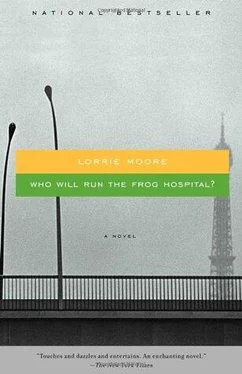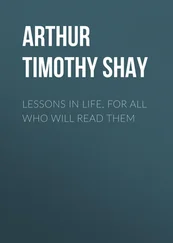I decide to get on the métro and go visit my friend Marguerite, who is a painter and printmaker, half French, half American, with an apartment near the Bois de Vincennes. I phone her from Châtelet. “Allô, oui?” she answers, which sounds to my bad ear like A lui , to him, to God, some religious utterance, a curse, or something to safeguard the speaker, but she explains later, “Oh, no. It’s said that way just in case the caller hasn’t heard the ‘allô.’ It’s a French distrust of technology.”
“In a country farci with nuclear power plants?”
“Ah, oui,” she says. “Les contradictions.” Marguerite is a woman I met in college, and though we were not that close, we always remained interested in each other and in touch. She is the sort of woman about whom others ask, “Oh, how is she? Is she still beautiful?” She reminded me early on of what perhaps Sils would be, could have been — she is tall and dazzling like that — and so I bring her my crush, inappropriate but useful between adult women, who need desperately to be liked and amused, and will make great use of any silent ceremony of affection. For the time being Marguerite is on Parisian welfare, which is so civilized as to provide tickets to such French necessities as movies and restaurants, and though she is loath to admit it, she is half-looking for a rich husband. In her I excuse everything I wouldn’t like in anyone else.
“I’ll be the one in the pith helmet,” I say before I hang up, wondering what that even means.
At her métro stop I get off and walk the three blocks to where she lives. She is sitting on the curb outside her building, like a kid rather than the forty-year-old woman she is. She has cut her hair off, shaved her head on one side, and with big antique earrings she manages to make all long hair seem a slatternly, inelegant bore. “Bonjour, mademoiselle!” I call in greeting, and when I get close, go suddenly formal; I stick my hand out and my fingers lock and go stiff, like a fistful of knives and forks. Luckily, she leaps up and hugs me, does the one kiss on the cheek, then two, three, four. “Four is chic now,” she says.
“I need Dramamine for four,” I say.
“It’s French love!” she says, and takes my arm, steers me through the locked gates and doors.
Inside she offers me water, shows me her work, her serigraphs, her latest culinary effort ( terrine de lapin : bowl of bunny), and even her new makeup, expensive and Japanese.
“Great,” I say loudly, idiotically, to everything. “Great!” She waves the makeup brushes around, the lipsticks and bottles, shouting, “Get out of my way, French women!” Which makes me laugh, because she is so beautiful already and because I have always thought of her as French. She points to her short skirt. “I will not cut my fashion to fit this year’s conscience.”
I smile. She has good legs. “Don’t,” I advise.
She wants to show me the galleries in her neighborhood, to demonstrate what, in a curatorial culture, “now constitutes the dynamic.”
“Great,” I say. So we leave the apartment, lock the door, tramp around the neighborhood. We visit an exhibit called “What Else Is There but Narcissism, I Often Ask Myself”—a collection of strangely silvered mirrors. We see another that is simply an arrangement of hundreds of dead pigeons. The artist, the gallery says in its write-up, was a homeless person, and this is his revenge on the pigeons who used to steal bread from his hands. After this installation opened, the gallery brochure informs us reassuringly, the artist received a grant.
“Are you OK?” asks Marguerite, noticing my walk. “You have a tourist’s blister? You have one of those underwear blisters?”
“It’s an old injury from the winter.” I begin to lie. “I slipped down the icy stairs at work.”
“At the Historical Society?”
“Yes,” I say. I cannot tell her the truth. Or can I? Can I tell you the truth? I might begin. And she might say, Bien sûr . And I would explain that, well, after weeks of fighting and months of door-slamming straight out of the most boisterous of farces, Daniel pushed me down the stairs.
Non, tu blagues! she’d say. And I would continue.
Non, je ne blague pas! Could I tell her? I was at a cocktail party with Daniel at Doctors’ Park, where his lab used to be. It always stank at Doctors’ Park, some war of septic and antiseptic, and I hated it there. He was flirting with a woman, and the woman’s husband turned to me and said in a rambunctious voice, “Well, your husband’s number at work is certainly a number at work!” He was drunk and winked at me in a bitter way. Then he began to sing “Every Valley Girl shall be exalted,” something meant for his wife to hear. They were going to have a fight when they got home. When Daniel was finished flirting, I went up to him and said, “Let’s go. I need to eat.”
“Why do you need to eat?” he asked, caught in the theater of stupid assertion that was starting to become our marriage.
“Why do I personally need to eat?”
“Yeah.”
“Because, if I don’t eat,” I said angrily, “I’m going to throw up from drinking too much.”
When we got home, I hurled my purse across the kitchen floor. “I think maybe I should go see Earl,” I said. Earl was Earl Gray, a matrimonial lawyer whom everyone in town called Mr. Tea. I believed myself to be unafraid of rupture. My engagement to Daniel had been years long and full of breakups.
“Fine,” said Daniel, and we stood there, in the fluorescent light, greenish and out of our minds. I got sharp-tongued and judgmental, an unfortunate but necessary combination. In the beginning was the Word, and it was a reproachful one. “I can’t stand this,” I said finally, “not knowing what you do, with whom, what it means. I can’t live like this. It’s like living with a wolf in the cellar as a pet — except he’s not a pet, in fact he’s not even a wolf, he’s a nuclear power plant!” I was drunk. “One of those shoddily constructed ones!” I marched over and threw open the basement door in some kind of attempt at illustration if not proof. “How many other women have there been? I want to know the truth! The truth!”
He was still and silent and sorry for me. Then he said, “I can’t tell you the truth.” “What do you mean you can’t tell me the truth? Why can’t you tell me?”
“Because you’d be shocked,” said Daniel. A look of bemused surliness came over him. “Not surprised —just shocked.”
I lunged. I swung at him with both fists, and he threw me off with such fury and determination that I stumbled backward, into the open stairwell to the basement, my feet hitting air, my whole body falling, pitching backward toward the wolf and the nuclear power plant, the world reeling, both slow and fast, a tiny rectangle of light with Daniel in it, and then just the dark space of the basement, the pummeling thud of the steps and my hip and head and shoes, scraping and sliding, and finally me at the cement bottom, on my side, in shock, saying “Whoops, wope, whoops.”
Perhaps there was some bit of expectedness, foreseeability, in it; even bad behavior must fall within some unconscious expectation in order for it not to seem monstrous.
Afterward, Daniel apologized and cried and visited me for hours every day in the hospital. Performing the sweet rituals that would keep us together; he knew I could not otherwise take him back. Once the penance is performed, at least at first, one has no choice. “Think of all those good, praying people who keep God around for the rest of us,” said Daniel, on his knees by my bed. “God has no choice; he must honor the rites; if it were just the rest of us riffraff down here, he’d be long gone. But he comes through because of the good ones. He honors the covenant, the vows. Think of yourself as God. Think of me as the moral mix that is all of humanity.”
Читать дальше












